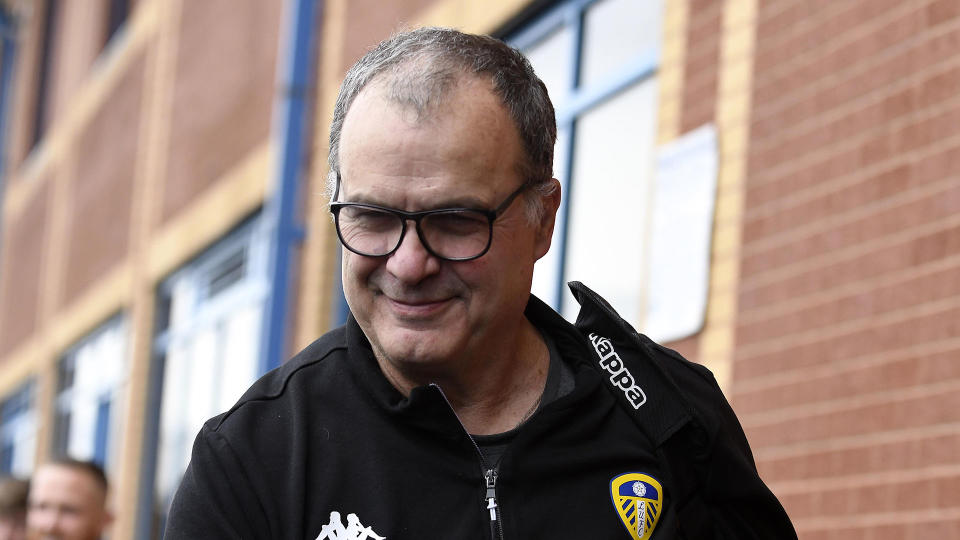Soccer now has its own Spygate, and we know about it thanks to the manager responsible
Soccer finally has its own Spygate.
More than 11 years after Bill Belichick and his New England Patriots staff were caught videotaping the New York Jets’ signals, soccer has its own spying scandal brewing.
Except that it kind of isn’t a scandal. Because the protagonist freely volunteered his spying on rival teams in a television interview, barely prompted. He is, of course, Marcelo Bielsa, manager of Leeds United, current leaders of England’s second-tier Championship.
And there’s a reason they call the Argentine El Loco, the crazy one.

There’s a reason Europe’s biggest clubs have never dared appoint him, in spite of successful periods as manager of Argentina, Chile, Athletic Bilbao and Olympique Marseille. Because Bielsa, 63, is impossibly mercurial. He once left the Lazio job after just two days, causing the Roman club to sue him for breach of contract. He walked out on Olympique just one game into his second season. In his first job in Europe, with Espanyol in 1998, he abandoned the club after only two months when the Argentina job opened up. Lille fired Bielsa after 13 games last season because he’d tried to push out all of his team’s best players.
And yet Bielsa retains a cultish following. He’s a hugely influential manager, inspiring a whole family tree of Bielsistas, including some of the top managers in the game. Like Tottenham Hotspur’s Mauricio Pochettino and Atletico Madrid’d Diego Simeone. Pep Guardiola is also among them. When the latter was appointed to his very first managerial job at FC Barcelona, the first thing he did was fly to South America to pick Bielsa’s brain on tactics for a few days.
Bielsa says he once sent Pep Guardiola his dossier on Barcelona as a gift and latter said he knew more about all his players than he did! #lufc pic.twitter.com/YphHr6BEdu
— Mark Walker (@markdw1966) January 16, 2019
Bielsa cuts an unusual figure. Hunched, he paces the sideline in a tracksuit during games, without actually looking at the action much. And then he’ll sit on a water cooler for long stretches, blankly staring out at the field.
He’s in his first season with Leeds, which is playing scintillating soccer on occasion. If it retains first place or even finishes second — or indeed reaches the third-place playoff and survives — Leeds will return to the Premier League for the first time since 2004, just a season after placing 13th.
Which is what made Bielsa’s admission so startling. He casually confirmed that he had in fact sent a spy to Derby County’s training session, when a journalist implied as much ahead of their game on Friday. Leeds beat Derby 2-0, by the way.
“It’s true there was someone from Leeds,” he said through a translator. “It doesn’t matter if this is legal, illegal, right or wrong. It’s enough [Derby manager] Frank Lampard and Derby felt it was not the right thing to do. I didn’t behave well. … Without trying to find a justification, I have been using this kind of practice since the qualifications for the World Cup with Argentina [starting in 2000]. This is not illegal, we have been doing it publicly, we talk about it in the press. For some people it is the wrong thing, for others it’s not.”
On Wednesday, Bielsa and Leeds suddenly called a press briefing. Initially, word got out that Bielsa was resigning again. Instead, he gave a full confession. And then … a presentation on some of the things he’d learned through spying on every single team in the Championship.
This is genuinely one of the Maddest/Genius things I’ve seen in football Bielsa outing @dcfcofficial to the entire league #LUFC pic.twitter.com/ICQDVkilzC
— Isaac (@isaacmartin484) January 16, 2019
“I’m going to make it easier for the [English Football League] investigation,” he began, according to several reports. “I observed all the rivals we played against. We watched all the training sessions before we played them. … I assume the possible sanctions by the authorities.”
“Regarding what I’ve done, it is not illegal,” Bielsa continued. “It’s not specified, described or restrained. It’s not seen as a good thing, but it is not a violation of the law.”
Then Bielsa went on a curious tangent, declaring that even though he spied, he didn’t consider it cheating because his intentions weren’t bad. And that he “did not try to get an unfair sporting advantage.”
And that he did because it wasn’t forbidden.
Or something.
Amazingly, the notoriously meticulous Bielsa then fired up a projector to lay out just what kind of intelligence he’d been gathering on his opponents. How his staff had watched all 51 games Derby had played the season prior, spending four hours on each. He said preparing for that game alone consumed 360 man hours, according to the Independent.
Then he explained how that much information was “absolutely not necessary.”
“So why do we do that?” Bielsa asked rhetorically. “Because we feel guilty if we don’t work enough. Because it allows us not to have too much anxiety. And we think that by gathering information we feel we get closer to a win.”
“In my case,” Bielsa concluded, “it’s because I’m stupid enough to allow myself this kind of behavior.”

Pochettino offered public support, explaining that this was common practice among Argentinian managers. “Here it is a little bit weird,” he said. “But in Argentina it happened – it is not a big issue or a big deal.”
What it boiled down to is that Bielsa spied on opponents to soothe his anxiety, not because he necessarily needed the information.
When Belichick finally and reluctantly apologized and owned up to recording signs, he claimed he had misinterpreted the rules. Bielsa, on the other hand, essentially said that he’d cheated because the cheating wasn’t really cheating. Insofar as there was no rule against it. He did it because he could, more so than because he needed to.
It’s the kind of logic-bending explanation that you’d expect from a generational soccer thinker like Bielsa. In that it sort of makes sense while also being a deeply weird thing to think. Let alone argue.
You can pontificate about ethics and sportsmanship, but at the very least Bielsa is honest about the excess he’s driven to by his competitiveness. And it’s eccentrics like him that keep soccer’s endlessly captivating narratives going. So let’s appreciate the strangeness and enjoy the theater that is Bielsa’s career.
He cheated because he could. Not because he needed to. The word of Bielsa.
Stay crazy, Loco.
— Ryan O’Hanlon (@rwohan) January 12, 2019
Leander Schaerlaeckens is a Yahoo Sports soccer columnist and a sports communication lecturer at Marist College. Follow him on Twitter @LeanderAlphabet.
More from Yahoo Sports:
• Report: Tourney nixes Ball’s team after $10K request
• Bob Costas announces his NBC career is over
• Deion Sanders has some advice for Heisman winner
• ’96 World Series MVP charged with child sex abuse


